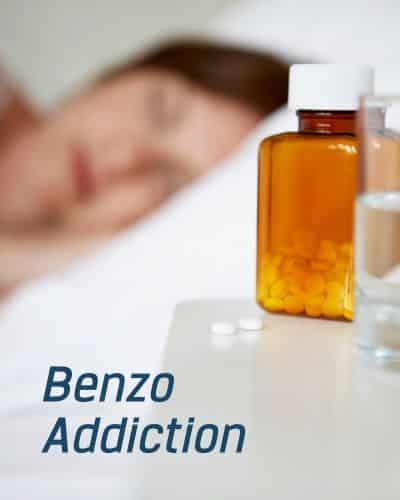Detoxing from Benzo Addiction
Benzo Detox is part of the treatment process for recovering from Benzodiazepine Addiction. Benzo addiction is a disease that makes a person compulsively use benzos even though the drugs are harming their health and well-being. Quitting benzos suddenly can cause life-threatening withdrawal symptoms. But before we get to the Benzo detox program, let’s learn about this drug.
According to the piece ‘Benzodiazepine Addiction & Abuse’, published by the UK Addiction Treatment Centers, Benzodiazepines are prescription drugs that cause long-lasting changes in the brain’s ‘reward system’ when taken for long periods. When a user takes benzodiazepines, they alter the levels of reward-producing natural chemicals, such as dopamine and norepinephrine.
Over time, the brain physically adapts so that it is unable to produce these chemicals on its own and becomes reliant on the drugs in order to feel normal. These effects on the brain can easily lead a person to Benzo Addiction.

There are well-recognized harms from the long-term use of benzodiazepines. These include dependency, cognitive decline, and falls. [1]
Benzodiazepines are different from other addictive substances such as heroin or cocaine as they don’t give the user an intense rush or buzz. Instead, the effects generally come on more gradually, giving the user a sensation of calm and sedation that can last for many hours.
Like any drug, the more you take, the stronger the sensations are. However, more than other drugs, benzodiazepines can be the basis of low-level, functioning addictions, where the user treats the drug as a pharmaceutical medication, keeping the levels constantly ‘topped up’.
Anyone who has struggled to stop using benzodiazepines will be aware of the serious effects they have on the mind and body. The drugs are designed to have an effect on almost every part of the brain – that is why they are so effective as anti-anxiety medication. But it is also why they can be so difficult to quit, Benzo detox brings enough help to deal with the side effects when you stop consuming benzos.
Onset of Benzo Withdrawal
Benzodiazepines are not intended to be taken long-term, as prolonged use or abuse can cause the brain to become both physically and psychologically dependent on them. Once Benzo Detox starts, withdrawal symptoms, may begin, ranging from a return of uncomfortable psychological symptoms to physical manifestations such as nausea and diarrhea, which may occur when the drugs are removed from the bloodstream.
Family history of drug dependency or previous issues with substance abuse and/or dependency may increase the likelihood of developing a dependency on a benzodiazepine and may potentially add to the withdrawal timeline duration as well.
Each benzodiazepine medication has a specific half-life that influences the length of time it takes for the drug to leave the bloodstream. If an individual is dependent on a benzo, once the drug is purged from the body, withdrawal may begin. For shorter-acting benzos like Xanax, withdrawal may start within 10-12 hours of stopping the drug. With a longer-acting benzodiazepine such as Valium, it may take a few days for symptoms to appear. Withdrawal side effects are not generally lethal, although they are best managed with professional medical attention and supervision.

Individuals taking benzos for several months or more and in high doses are likely to experience more withdrawal symptoms that last longer than those taking smaller doses for a shorter length of time. For example, the U.S. Food and Drug Administration (FDA) reported that patients taking doses of 4 mg/day or higher of Xanax for longer than three months were more likely to become dependent on the drug and therefore more likely to experience more uncomfortable withdrawal symptoms than those taking smaller doses for less time. [2]
Some short-acting benzodiazepines, like Xanax, are thought to be more potent than some of the longer-acting ones, such as Valium, as well. While withdrawal will be similar for both, users of short-acting benzos may experience withdrawal symptoms sooner and with more intensity, as benzos with longer half-lives will stay in the body longer, therefore slowing the onset of withdrawal.
Benzodiazepines are all designed as central nervous system depressants; however, they each may work slightly differently at targeting certain symptoms. For example, Restoril, Dalmane (flurazepam), and Halcion (triazolam) are considered primarily hypnotic benzodiazepines prescribed for insomnia, while Xanax, Ativan, Librium (chlordiazepoxide), and Valium are classified as anxiolytics used to treat anxiety symptoms. Klonopin is considered primarily an anticonvulsant.
Different metabolites of these medications make them slightly different, which may also affect how quickly they leave the bloodstream. Withdrawal from different benzodiazepines is generally thought to bring the same general symptoms; however, it is possible that an individual withdrawing from a hypnotic may have more disrupted sleep patterns while withdrawal from an anxiolytic may include higher levels of anxiety.
The method of ingestion is also related to the onset of withdrawal. For instance, snorting or injecting benzos sends the drugs straight into the bloodstream to take almost instant effect. Ingesting a pill requires that it be digested through the digestive tract, which creates a less intense high and slower onset of withdrawal symptoms.
Benzo Withdrawal Symptoms
The withdrawal symptoms of benzodiazepines are physically and emotionally painful, and can even be life-threatening if the user stops “cold turkey.” Those with a history of taking higher doses or taking the substance for a prolonged time have the worst withdrawal symptoms. Benzodiazepine withdrawal symptoms are highly variable and often come and go during the Benzo detox process. They may vary in severity and frequency throughout all phases of the withdrawal process.
During the Benzo detox process the most common benzo-withdrawal symptoms, often called “rebound” symptoms, usually manifest within one to four days of discontinuing use, depending on the benzo used, the amount of use, and the frequency of use. These symptoms typically last up to ten days and include:
Benzodiazepine Side Effects
- Sleep disturbances
- Increased tension
- Anxiety
- Panic attacks
- Difficulty concentrating
- Excessive sweating
- Cravings
- Heart palpitations
- Headache
- Muscular stiffness or discomfort
- Mild to moderate changes in perception
- Hand tremors
Less common and more severe symptoms can occur as well, especially in cases of severe addiction. These include:
- Hallucinations
- Seizures
- Psychosis or psychotic reactions
- Increased risk of suicidal ideation
Benzo Detox and Rehab
Benzo addiction treatment usually starts with a gradual detoxification process (Benzo Detox). If a person has been taking high levels of benzos for longer than eight weeks, it’s critical to wean them off the drugs slowly to decrease the severity of withdrawal symptoms.
Inpatient Benzo Detox: The safest and most comfortable way to detox from benzos is with medical supervision. Inpatient detox is usually warranted when a person takes large doses of benzodiazepines for a long time. During inpatient detox, you’ll be closely monitored, and you may receive medications to help alleviate symptoms.
Once physically stable, you can transition to the next phase of Benzo detox treatment. While everyone’s treatment plan is unique to their needs, most people attend a combination of group and individual therapy and counseling. During rehab, you’ll learn more about the roots of addiction and develop tools to help you cope with cravings and avoid relapse.

Rehab is available on both an inpatient and outpatient basis, depending on the severity of your addiction. The length of treatment may also vary, depending on your situation, but successful treatment typically requires weeks or months. Inpatient treatment is often most effective because it allows people to focus 100 percent on their recovery without disrupting their routine.
Outpatient therapy provides the same types of treatment and counseling but enables clients to return home every night. That way, they may keep up with work and other personal responsibilities while receiving treatment. Individuals do best in outpatient therapy when they have a strong support system to help them recover. [3]
Benzo Detox Aftercare
While relapse from drug addiction is common, participating in aftercare programs increases your chances of staying sober after you’re done with structured treatment.
Aftercare programs reinforce healthy lifestyle choices and stress coping mechanisms. They can also help you recognize relapse triggers and minimize the damage if you do end up relapsing.
Some people choose to enter sober living after they graduate from rehab. In these drug-free group living environments, they can gently ease back into the demands of regular life.
Others may choose individual counseling. Many people in recovery also attend 12-step group meetings for continued support and encouragement. Meetings are usually free and readily available — and studies have demonstrated one-year abstinence rates of 80 to 90 percent when individuals attend self-help group meetings or other types of weekly continuing care after finishing formal treatment. [3]
Benzo Detox At Home
Trying the Benzo Detox at home would be a grave mistake, as benzo’s withdrawal symptoms can be unpredictable and dangerous to deal with without medical assistance. However, the goal of a discreet at-home detox experience is not recommended, this timeline and the severity of symptoms rest on several factors, such as the length of time of the benzo addiction, the usual daily dosage, and the individual’s general health status, that is why this process could be unsafe to do it at home, without medical supervision.
Benzo Detox in California, reclaim your life from Betox Addiction
Benzo Addiction is a condition that can cause major health, social, and economic problems that should not be taken lightly. We Level Up Treatment Center can provide you, or someone you love, the tools to recover from this disease with professional and safe supervision for Benzo Detox treatment. Feel free to call us to speak with one of our counselors. We can inform you about this condition by giving you relevant information. Our specialists know what you are going through. Please know that each call is private and confidential.
Sources
[1] Brett, J., & Murnion, B. (2015). Management of benzodiazepine misuse and dependence. Australian prescriber. (Ncbi.nlm.nih.gov)
[2] U.S. Food and Drug Administration (FDA) (www.fda.gov/)

